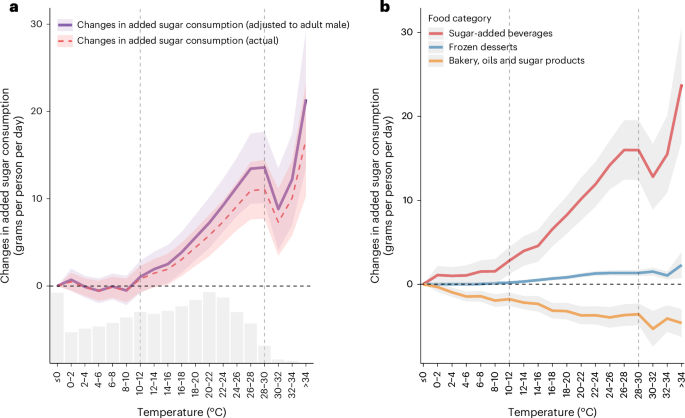在美国,不断上升的气温增加了弱势群体对添加糖的摄入
IF 27.1
1区 地球科学
Q1 ENVIRONMENTAL SCIENCES
引用次数: 0
摘要
极端高温可能会通过增加饮料和冷冻甜点的摄入量来影响添加糖的摄入量,但这种影响很少被量化。在这里,我们使用了2004-2019年美国家庭的个人交易水平数据,发现添加糖的消费量与温度呈正相关,特别是在12-30°C范围内,其速率为0.70 g°C−1。这主要是由于含糖饮料和冷冻甜点的消费量增加所致。这种影响在收入或教育水平较低的家庭中更大。我们的预测表明,到2095年,全国范围内的添加糖消费量将大幅增加,每天2.99克(相当于升温5°C),弱势群体面临的风险更高。我们的研究结果强调了减轻过量摄入添加糖带来的健康风险和探索饮食适应气候变化的迫切需要。本文章由计算机程序翻译,如有差异,请以英文原文为准。


Rising temperatures increase added sugar intake disproportionately in disadvantaged groups in the USA
Extreme heat may affect added sugar consumption through the increased intake of drinks and frozen desserts, but such an impact is rarely quantified. Here, using individual transaction-level data for US households in 2004–2019, we find that added sugar consumption is positively related to temperature, notably within 12–30 °C at a rate of 0.70 g °C−1. This is primarily driven by the higher consumption of sugar-sweetened beverages and frozen desserts. The magnitude of such impact is larger among households with lower income or educational levels. Our projections indicate a substantial nationwide increase in added sugar consumption of 2.99 g per day by 2095 (or equivalently 5 °C warming level), with vulnerable groups at an even higher risk. Our results highlight the critical need to mitigate health risks from the over-intake of added sugar and to explore dietary adaptation to climate change. Few studies have evaluated how climate change may affect dietary habits and nutritional health. Here, using transaction data in the USA, the authors show that added sugar consumption increases with temperature, especially between 12 °C and 30 °C, with stronger effects among lower-income and lower-education groups.
求助全文
通过发布文献求助,成功后即可免费获取论文全文。
去求助
来源期刊

Nature Climate Change
ENVIRONMENTAL SCIENCES-METEOROLOGY & ATMOSPHERIC SCIENCES
CiteScore
40.30
自引率
1.60%
发文量
267
审稿时长
4-8 weeks
期刊介绍:
Nature Climate Change is dedicated to addressing the scientific challenge of understanding Earth's changing climate and its societal implications. As a monthly journal, it publishes significant and cutting-edge research on the nature, causes, and impacts of global climate change, as well as its implications for the economy, policy, and the world at large.
The journal publishes original research spanning the natural and social sciences, synthesizing interdisciplinary research to provide a comprehensive understanding of climate change. It upholds the high standards set by all Nature-branded journals, ensuring top-tier original research through a fair and rigorous review process, broad readership access, high standards of copy editing and production, rapid publication, and independence from academic societies and other vested interests.
Nature Climate Change serves as a platform for discussion among experts, publishing opinion, analysis, and review articles. It also features Research Highlights to highlight important developments in the field and original reporting from renowned science journalists in the form of feature articles.
Topics covered in the journal include adaptation, atmospheric science, ecology, economics, energy, impacts and vulnerability, mitigation, oceanography, policy, sociology, and sustainability, among others.
 求助内容:
求助内容: 应助结果提醒方式:
应助结果提醒方式:


